LG USC9S vs Sonos Arc: which Dolby Atmos soundbar is best for you?
Which is your TV's perfect partner?
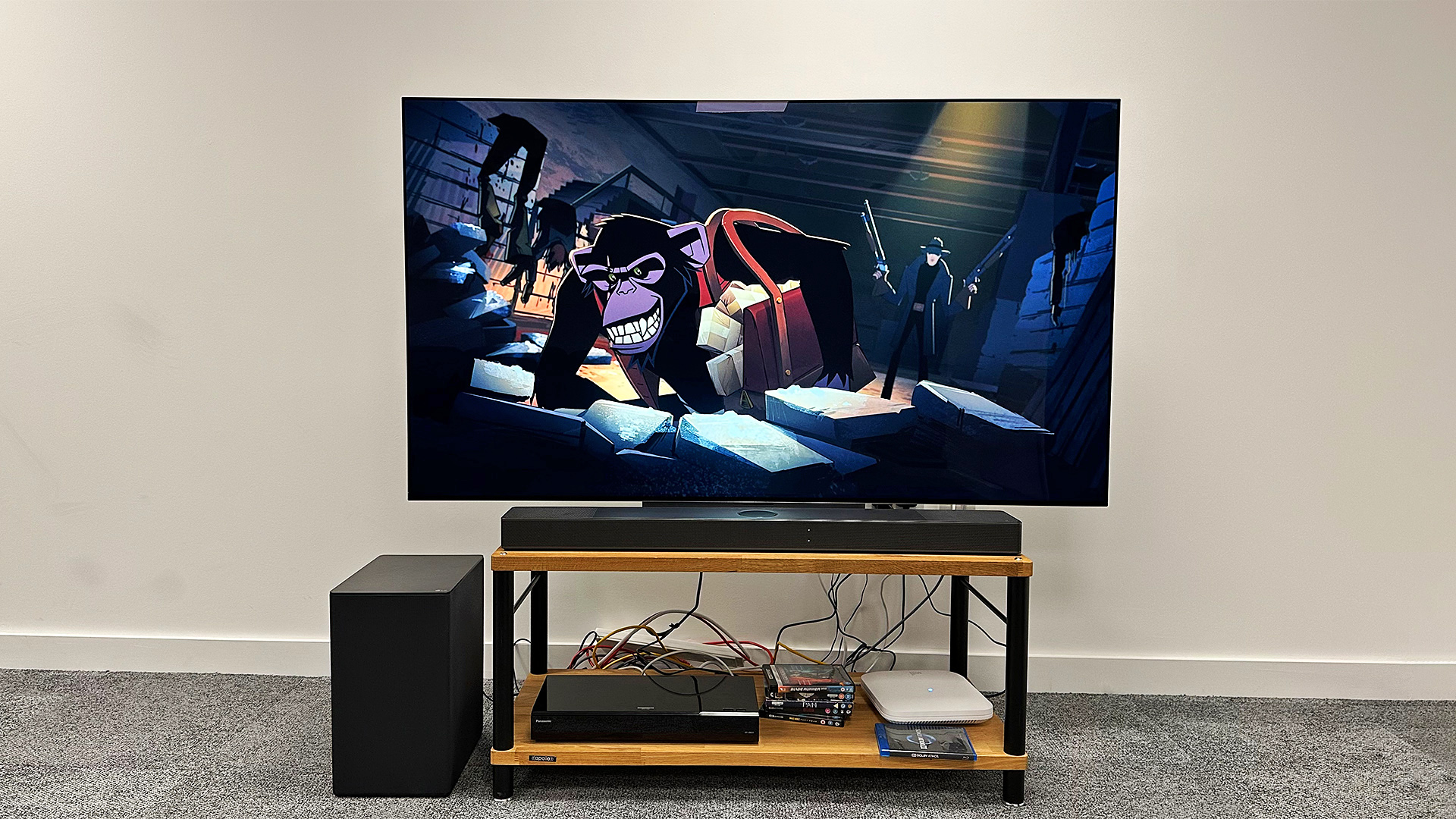
Connectivity: HDMI out (eARC), 1 x HDMI in, optical, USB, ethernet, wi-fi, Bluetooth
Sound formats: Dolby Atmos, DTS:X, IMAX Enhanced
Streaming: Apple AirPlay 2, Chromecast, Spotify Connect, Tidal Connect
Dimensions (hwd): 6.3 x 98 x 13cm
The USC9S is well-specced and has some unique features when paired with certain models from LG's 2022 and 2023 range of OLED TVs. Plus it's less wide than the Sonos Arc. But it's underwhelming in the sound department, and much too expensive to challenge the best at this level.
For
- Weighty and spacious sound
- Good synergy with LG TVs
- Extensive feature set
Against
- Inexpressive and emotionless
- Unsubtle low end
- Lack of forward projection
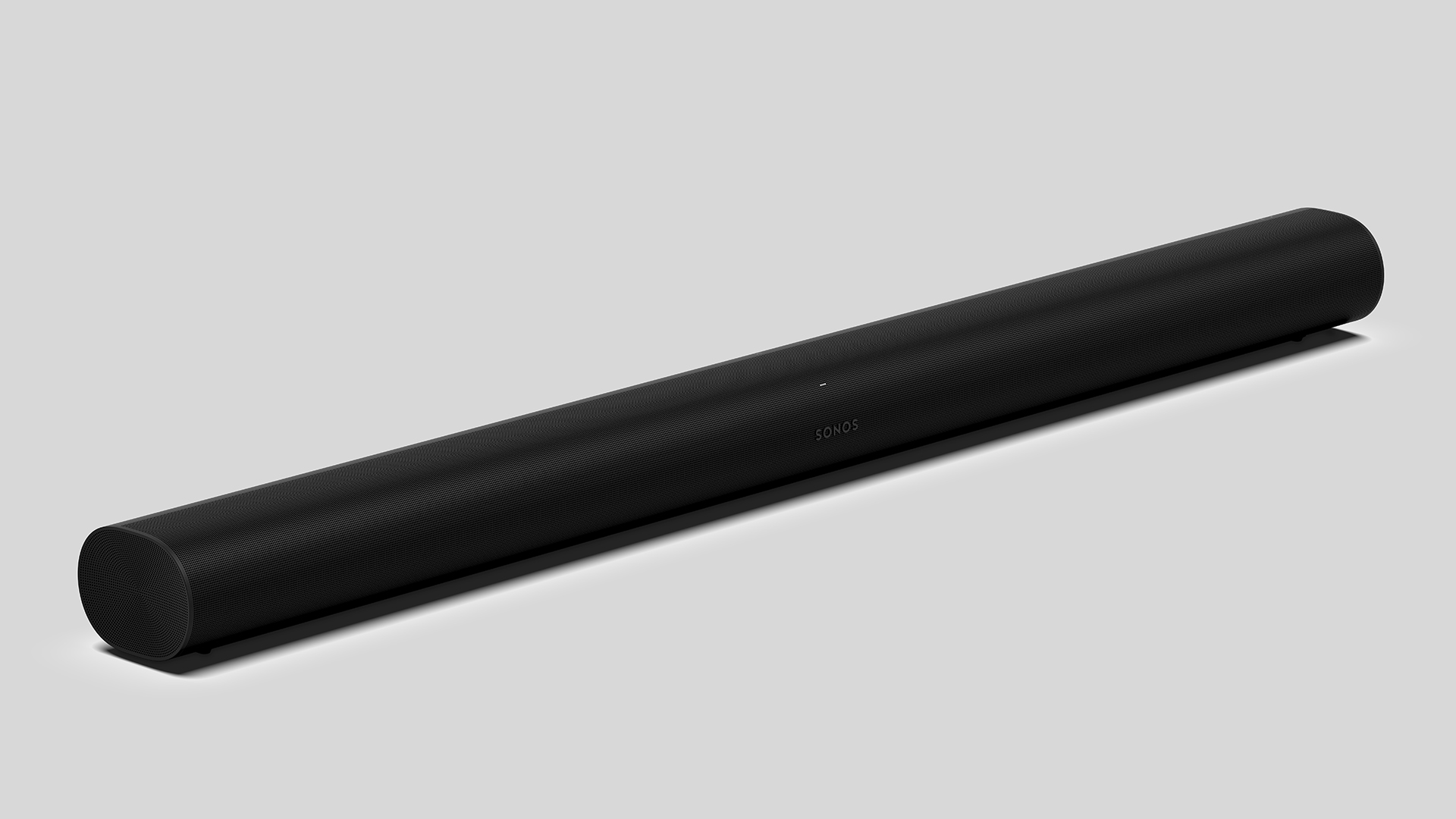
Connections: HDMI out (eARC), optical, ethernet, wi-fi
Sound formats: Dolby Atmos, DTS
Streaming: Apple AirPlay 2, Spotify Connect, Tidal Connect
Dimensions (hwd): 8.7 x 114 x 12cm
The Arc is still the king. Great to look at, effortless to use and even better to listen to, it takes Dolby Atmos 3D sound to another level, and fits seamlessly into a wireless multiroom set-up. It's adept at handling music, too. A three-times Award-winner for very good reason, despite its lack of HDMI pass-through and support for DTS:X.
For
- Convincing Dolby Atmos
- Dynamic, detailed, controlled
- The usual Sonos smarts
Against
- Music could be better projected
- Rivals sound weightier
- No HDMI pass-through
Even a cheap soundbar will sound much better than most TVs, but if you're willing to spend more, you can really enhance your home cinema experience. The Sonos Arc has won a What Hi-Fi? Award every year since it launched in 2020 – its latest victory proves it's still the soundbar to beat in its price category. But what's this, a new challenger?
The LG USC9S launched recently in the same price bracket, meaning it's up against some stiff competition. Can it steal the Arc's crown?
LG USC9S vs Sonos Arc: price
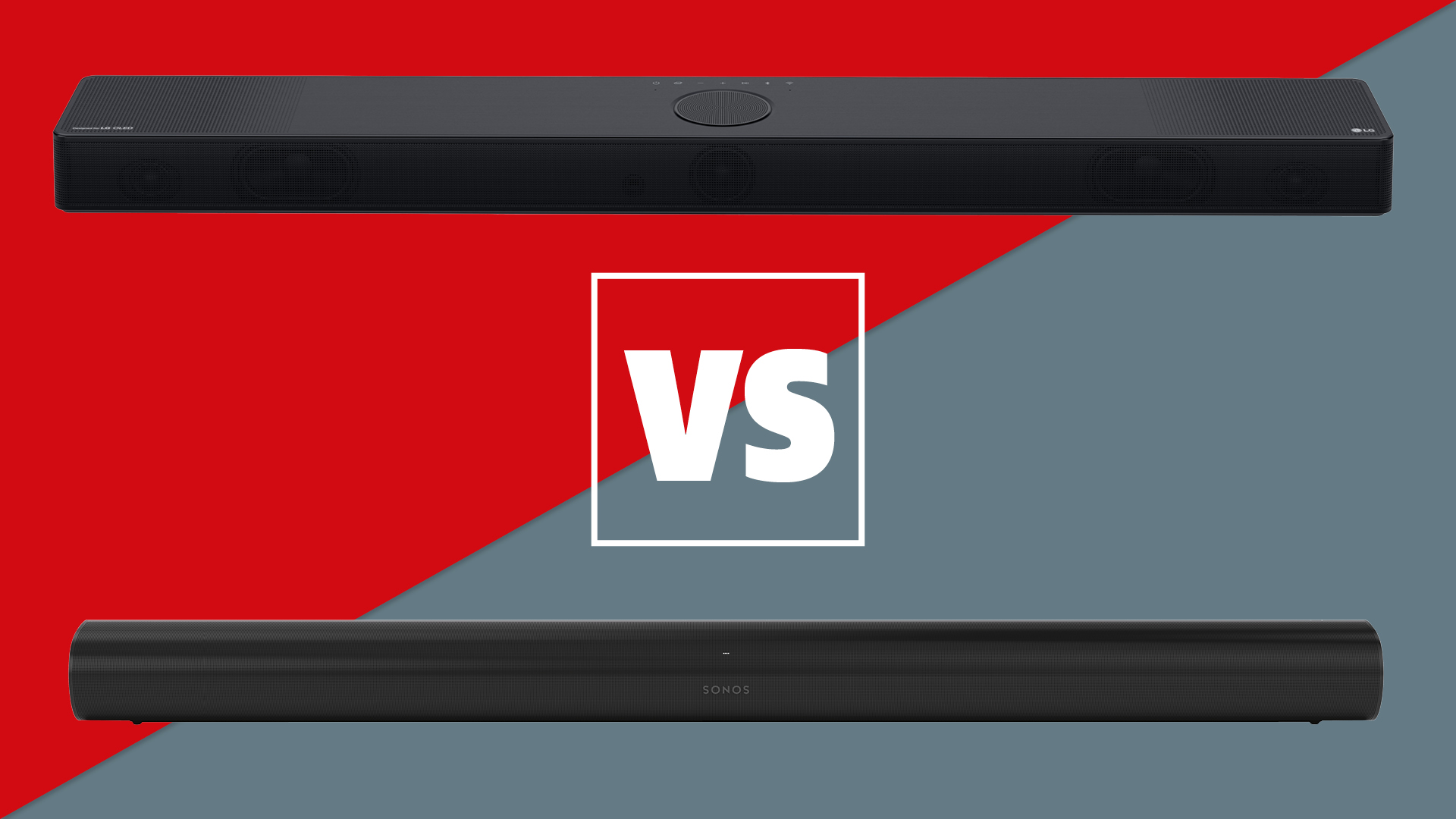
The Sonos Arc has been around for three years now, but if you were hoping for a discount, you're out of luck. It's actually more expensive now than when it launched – blame Sonos' prestige, meaning deals are few and far between, not to mention those pesky "global economic headwinds" that are making life so miserable for so many people. It's now £899 / $899 / AU$1499 (though at time of writing it's on offer for AU$1199). That RRP is a full £100 / $100 / AU$100 more than its launch price. Ouch.
The LG USC9S is similarly priced – it retails at £999 / $999 / AU$1499. It can be found a little cheaper than that though – around $800 in the US and AU$1200 in Australia, at time of writing. Brits will have to pay full whack, for the time being at least.
The USC9S price includes a wireless sub and a bracket for attaching the soundbar to an LG C2/C3 TV.
Winner: Draw
LG USC9S vs Sonos Arc: design
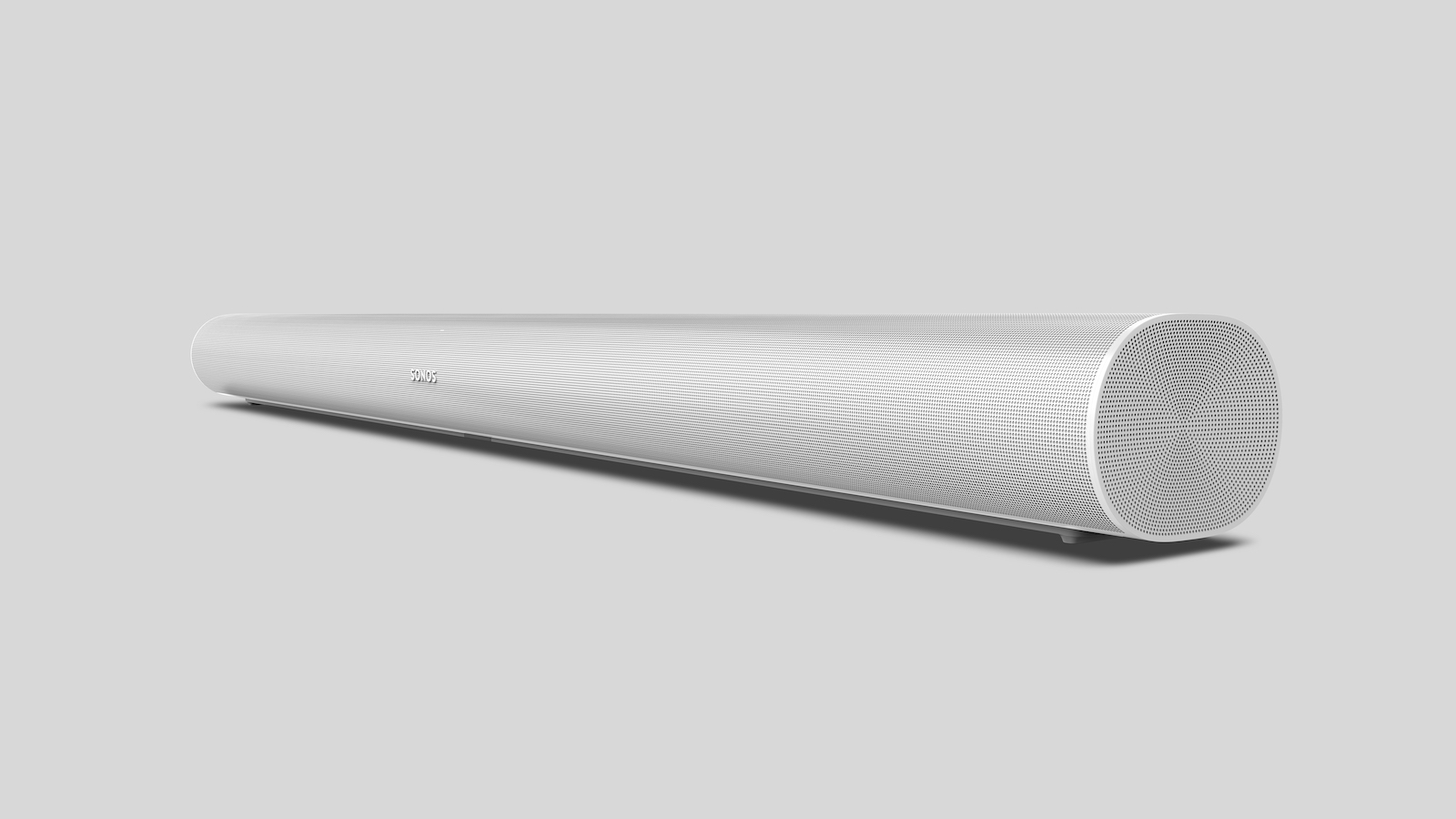
The Arc is designed to fit a 55-inch TV – partner it with a smaller model, and it'll look a bit oversized. It can be wall-mounted too, though you'll have to pay extra for the bracket.
Its curvy design (complete with grille covering the speaker drivers) is very easy on the eye, and about as aesthetically pleasing as soundbars come.
Four LEDs sit above the Sonos logo. They're off most of the time, and when they do come on (when you adjust the volume, for example), their brightness adjusts to the room's ambient light so they're never too bright. It's neat touches like this that help distinguish the Arc as a premium product.
The USC9S is an LG soundbar made primarily for LG TVs – the 55- to 77-inch C2 and C3 OLED TVs, to be exact. It does work with other makes and sizes of TV, but it's designed to be mounted to these models in LG's C-series. All the kit required to do this comes in the box, so you won't need to spend any extra. Pair it with one of these models, and it integrates seamlessly with the TV, being positioned so that the audio from the up-firing drivers isn't blocked by the telly itself.
Don't own an LG TV? No problem. The USC9S isn't very tall, so shouldn't obscure any of the picture, regardless of what TV you pair it with. It's quite deep, but a fair bit less wide than the Arc, meaning it'll fit a wider range of TV cabinets.
Like the Arc, there's a grille hiding the speakers and LEDs that change colour and sequence depending on the function. This can be a bit confusing – it's like learning Morse Code – but a voice also announces which input and feature are activated. Helpful aid? Or admission of failure? You decide.
Winner: Sonos Arc
LG USC9S vs Sonos Arc: features

How can LG expect to take on the foremost soundbar in its price bracket? With the world's first Dolby Atmos soundbar with three up-firing channels, that's how. The upward-firing drivers at each end are joined by one in the middle. Add to these the three front-firers, and you get a 3.1.3-channel arrangement (including the wireless subwoofer). It's good for 400W of power, and handles all the major sound formats, including Dolby Atmos, DTS:X and IMAX Enhanced.
The bar creates a virtual middle layer through the use of an HRTF (Head Related Transfer Function) 3D engine. This is billed as 'Triple Layer Spatial Sound' which creates a 'Virtual Sound Dome', according to LG. (We'll get to how it actually sounds in the next section.)
There's an HDMI out for hooking it up to your TV, and – unlike the Sonos Arc – an HDMI in. Its HDMI sockets are 2.1-rated and capable of passing through gaming-specific features such as 4K/120Hz, VRR and ALLM. That's all good, although Dolby Vision gaming and VRR are limited to 4K/60Hz rather than the full 4K/120Hz that the LG C3 and C2 OLED TVs are capable of.
It also has some features that are unique to LG TVs from its 2022 and 2023 ranges. Wow Orchestra employs the TV's speakers alongside the soundbar's at the same time for a more impactful sound. And Wow Interface puts most of the soundbar's functions on the TV's menu, so you can select and tweak them on-screen.
Music-wise, the USCS9 ticks most of the boxes. It supports hi-res files up to 24-bit/96kHz, and is compatible with Spotify Connect, Tidal Connect, AirPlay 2 and Bluetooth 5.0.
Just like the USCS9, the Sonos Arc supports eARC (Enhanced Audio Return Channel), so it can handle higher-quality Dolby Atmos signals from TVs that can output them (from a 4K Blu-ray player or Xbox, say).
The Arc might only have two up-firing drivers – to the USC9S's three – but it does have a total of 11 drivers (two on the top, one on each end and seven on the front). You can easily integrate the Arc into a true surround system with the addition of other Sonos speakers such as the Era 100 as rear speakers, and the Sub Gen 3 / Sub Mini to handle the low end.
But even without adding extra speakers, the Arc is eminently capable. It calibrates its sound to the room using Sonos' Trueplay tech, while you can tweak the levels using the excellent Sonos app (which is way more feature-rich and intuitive than LG's rival). There are extra modes depending on what you're watching at what time of day: Night Sound flattens the audio and reduces bass so as not to wake the rest of the household, while Speech Enhancement projects dialogue more clearly.
The Arc is on a par with the USCS9 in terms of compatible streaming services, though there's no Bluetooth and it only supports hi-res up to 24-bit/48kHz, not the 96kHz of the LG. But it does have both Alexa and Google Assistant, whereas the USCS9 only has the Alexa voice assistant onboard.
Winner: LG USC9S
LG USC9S vs Sonos Arc: sound
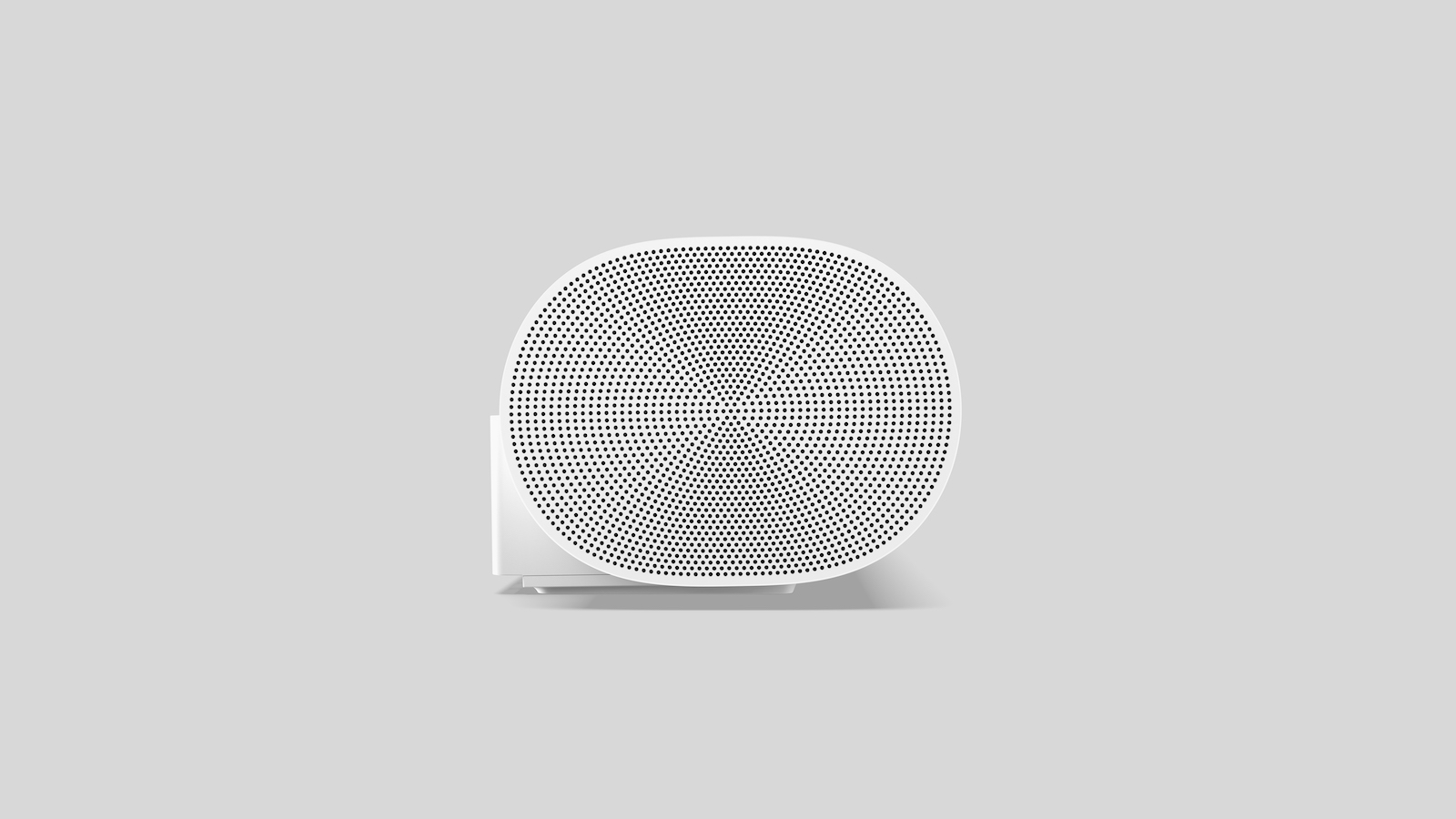
Both of these soundbars are compatible with Dolby Atmos, but that doesn't in itself mean they sound any good. The Dolby Atmos badge is a bit like a license to sell alcohol – all pubs need it in order to operate, but there's still a huge difference in the quality of what they serve.
These two soundbars illustrate that perfectly. They're both Atmos-approved, both laden with drivers (including the all-important upward-firing speakers to add the element of height) and both cost about the same. But their performances couldn't be more different.
For the Arc, Sonos claims to have done a lot more than just point two speakers towards the ceiling. It iterated the curvature of the internal waveguides, overhauled Trueplay to account for ceiling distance, angles and acoustics, and tuned the Arc with Atmos content producers in music, movies and TV.
And it shows. The Arc delivers one of the most convincing Atmos presentations of any soundbar we’ve heard. Sounds fill the room, but they're also placed with a precision rarely heard from a model at this price. They're very distinct, too – areas open to the elements sound airy and spacious, while inside sounds are more muffled. It handles bigger dynamic shifts with aplomb, and the bass performance is really well judged, even without the addition of a wireless subwoofer. One listen, and you'll hear why it's picked up three What Hi-Fi? Awards in a row.
It's adept with music, too. Even busy tracks are rendered into cohesive wholes, while the spatial and rhythmic organisation is impressive. The one downside is a slight lack of forward projection, but that's a minor niggle given its considerable strengths.
And the LG USC9S? Well...
The good news is it's not awful. But at this price, against the Sonos Arc, it needs to do a lot better to be competitive.
It has three sound modes: Standard, Cinema and AI Sound Pro. Standard enhances the midrange, but is too narrow, soft and unexpressive elsewhere. AI Sound Pro adds a bit more oomph and spaciousness, stretching the audio far beyond the confines of the TV. But for movies, you want Cinema mode. This essentially has the same effect of AI Sound Pro but with added weight.
But this brings its own problems. Fine details are lost, and low-level dynamic shifts are all but nonexistent. This leaves voices a bit flat and expressionless – not ideal if you're watching a drama. Or any genre, for that matter, bar a silent movie. And while the sub does add bass, it's not very composed when pushed.
The Wow Orchestra feature does bring some much-needed projection, making voices much more direct. But it still lacks the detail, clarity and overall finesse of the Sonos Arc – and it's a feature that's only available to LG TV owners.
Musically, it's no better. The soundbar is a bit underpowered, and the sub too overbearing – they're the Sid Little and Eddie Large of the home cinema world.
Winner: Sonos Arc
LG USC9S vs Sonos Arc: verdict
It's a bit of a drubbing. The LG USC9S is by no means a bad soundbar, and if you have a 55- to 77-inch LG C2 or C3 you'll undoubtedly get plenty of enjoyment from the extra features and seamless integration. But even then, the sound pales next to the Sonos Arc.
Add the natty design, multiroom skills and superb app, and you've got the best Dolby Atmos soundbar in its price range. At three years old and counting, that's testament to the quality of the Arc.
MORE:
Also consider the Sony HT-A7000
Sony HT-A3000 vs Sonos Beam Gen 2: which Dolby Atmos soundbar is best?
Best soundbars: top options for every budget, tried and tested
Get the What Hi-Fi? Newsletter
The latest hi-fi, home cinema and tech news, reviews, buying advice and deals, direct to your inbox.
Joe has been writing about tech for 20 years, first on staff at T3 magazine, then in a freelance capacity for Stuff, The Sunday Times Travel Magazine (now defunct), Men's Health, GQ, The Mirror, Trusted Reviews, TechRadar and many more. His specialities include all things mobile, headphones and speakers that he can't justifying spending money on.

